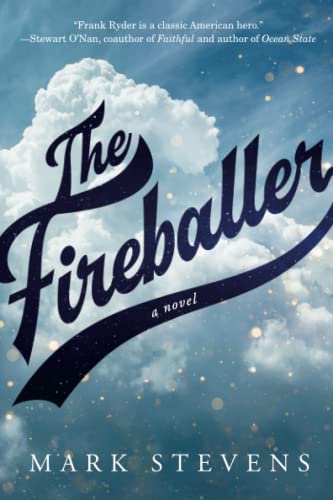ByRobin Widmar
Fans of the Colorado Rockies know all too well what it’s like to spend entire seasons watching their team’s chances to play in the post-season vanish like snow in sunlight. In “The Fireballer” by Mark Stevens, beleaguered Baltimore Orioles fans have shared that same, sad experience — that is, until pitching phenom Frank Ryder comes along.
Ryder’s fastballs are routinely clocked at more than 100 miles per hour, but it’s just another day on the mound for him. “Ryder’s body knows the effort required for top speed. The timing. The torque. The reach. It’s music. There’s a beat to it, deep in his soul.” His consistently high pitching speed frustrates opposing batters who cannot react quickly enough to connect with the ball. His fans, though, are thrilled. With Ryder in the pitching rotation, the Orioles have a shot at the playoffs for the first time in a long time.
As much as Ryder’s pitching has breathed new life into a sometimes lackluster team, it is also creating headaches across Major League Baseball. Some club owners argue that the low number of hits off of Ryder’s pitches makes for dull games — and lower revenue. Who wants to pay to see their team trounced time and again by a fireball-throwing ace?
Then there is the issue of injuries at the plate. Ryder’s throws are precise, but at those speeds, a wayward ball has the potential to seriously injure a player. In the interest of keeping fans happy and protecting batters, team owners propose regulating pitch speeds — a fictional premise that is not far-fetched considering recent real-world changes in the MLB. Ryder finds himself drawn into the debate over what some consider the natural evolution of the sport, and his is a particularly unique perspective.
Every time Ryder steps onto the diamond, he faces two opponents: the opposing team and the ghost of a tragic incident during his Little League days. In spite of his success in the big leagues, he struggles to reconcile his guilt with the person everyone thinks he is, and that he wants to be.
Then it happens. An errant pitch sends a batter to the hospital and sends Ryder into a downward spiral right before the All-Star game he is slated to play. His future is in question and so is the rest of his team’s season. Ryder must confront his ghost if he is ever to step on the mound again as an MLB pitcher, let alone help his team win the World Series.
Author Mark Stevens, known more for his mystery novels than sports writing, fills his story with tropes that do not feel like tropes thanks to solid writing, multi-dimensional characters, realistic dialogue and carefully selected details that immerse readers in Frank Ryder’s world. One example is the veteran baseball reporter from The New York Times who doggedly seeks out anyone who can “spill the beans on the phenom’s dark side. … Everybody knows about the one tragic, fluky incident way back when. There must be more. There is always more.” (Spoiler alert: not really.)
Another well-developed character is Maggie, the down-to-earth, long-term, long-distance girlfriend who keeps Ryder grounded and acts as his North Star. She is a woman who lives life on her terms but loves Ryder deeply enough to support his dreams as well. The conversations between the two are playful, thoughtful and revealing.
A host of team managers and statisticians scramble to balance the needs of their ball club against the calls for Ryder-inspired rules to rein in this bulldozer of batting rosters. They, too, are more than mere set dressing for the story, and each has their own story and views to share.
“The Fireballer” is more than just a baseball tale. It is also about a man finding his way in the world while carrying the dual burdens of a past tragedy and a city’s newly restored hope for its nearly hopeless baseball team. Frank Ryder is likeable, an all-American, boy-next-door kind of guy. He is not flashy or arrogant or prone to landing in the headlines for the wrong reasons. Whether he makes peace with the past and achieves “happily ever after” is up to the reader to discover, but the book’s conclusion is both satisfying and appropriate.
Readers do not have to know baseball to enjoy Ryder’s story, but those who follow the sport will feel right at home thanks to the author’s extensive research. Now, if we could just get Frank Ryder traded to the Rockies.







